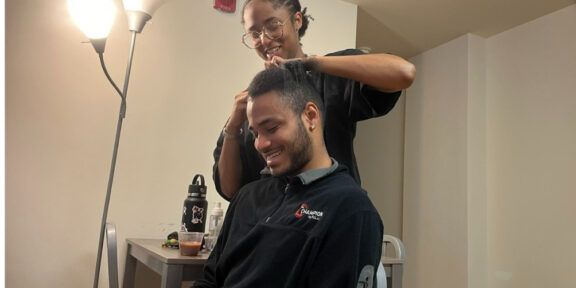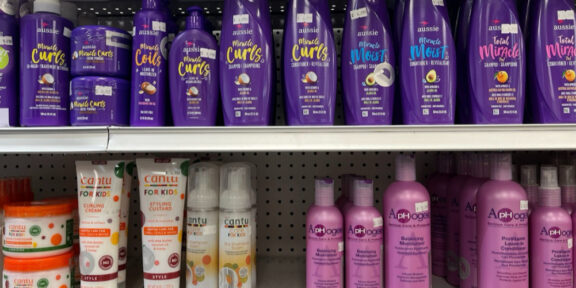By Makenna Underwood
Skincare routines and products are trending on social media. But, the improper use of products can damage the skin in the long run.
“The pressure to have an extensive skin care routine is real, and sometimes it can feel like you’re supposed to be using every serum and active ingredient under the sun for that elusive ‘best skin ever,’” said Renée Rouleau, founder of RENÉE ROULEAU skin care products.
Though the complexity of skin care routines can vary by preference, dermatologists say there are guidelines for mixing skincare ingredients.
“Mixing and layering your serums won’t give you the best results—you should be rotating one at a time instead,” Rouleau said.
Retinol & Benzoyl Peroxide

A woman applies facial cream. Face masks are used after using various skin care products. (Photo courtesy of Polina Kovaleva)
Retinol is an ingredient in mostly anti-aging skincare products like serums and creams. Retinol is derived from vitamin A and is used to reduce the signs of aging and acne.
Benzoyl peroxide is another skincare ingredient used to reduce acne. The peroxide is commonly found in brands such as PanOxyl and CeraVe.
“Retinol should not be used with vitamin C or benzoyl peroxide products, as this can cause irritation. If you do want to use a product containing vitamin C. Apply it at a different time of day than your retinol product,” Kim Gallo, a clinical esthetician, said.
Niacinamide & Vitamin C
Niacinamide is a type of vitamin B3 that can treat acne and hyperpigmentation, dark spots caused by an overproduction of melanin.
Vitamin C is also an ingredient familiar in products that treat hyperpigmentation and protect the skin from sun damage.
According to Paula’s Choice, an American-based skincare company, mixing niacinamide and vitamin C can “neutralize the effectiveness of both ingredients and two, it might create a substance (nicotinic acid, also known as niacin) that reddens skin.”
Instead, you can mix niacinamide with many ingredients already a part of your regime: retinol and salicylic acid–an acne-fighting skincare ingredient.
SPF & Makeup

A woman applies sunscreen to her shoulder. SPF is commonly used to fight against sun damage and could be used alone or with makeup. (Photo courtesy of Armin Rimoldi)
While one can apply SPF before applying makeup, one should not mix with foundation and other makeup products. According to Image Skincare, a skincare brand could “potentially dilute its effectiveness” and cause some areas of the skin to receive less SPF than others.
Imara Moore, a Howard University journalism significant and graphic design minor from Portland, Oregon, has been using skincare products since middle school and learned that fewer skincare products are better for skin than more extensive skincare routines.
“Compared to using toners and mists and all this extra stuff, I feel it didn’t do much for my skin. It kind of made it worse, honestly. I just stick to less now,” she said.
While dermatologists don’t suggest mixing these ingredients, users can protect their skin by applying SPF under their makeup or by itself to protect the skin from ultraviolet rays.














